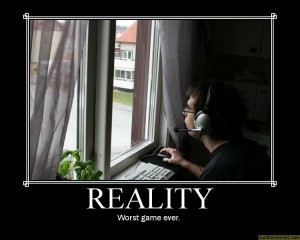Over the last year (really even before that), an interesting trend has arisen, towards bridging the gap between the real world and the world of video games. For those not familiar with this concept, it’s called “Gamification“, and it’s the application of video game mechanics and concepts to areas outside the video game industry.
The last few years have seen some incredible game success stories: World of Warcraft, Farmville (on Facebook), and Club Penguin are just some examples. So successful are they, and the lessons learned from watching players interact with these systems, companies all over the world are adapting aspects of gaming to things like credit cards, teaching, scientific research and air travel.
If you believe the likes of Jesse Schell, Seth Priebatsch and Jane McGonigal, gamification is absolutely the next big thing. But while it’s getting a lot of press this year, it’s not a new phenomenon. The concepts that underlie gamification are behavioural economics, and organizational behaviour: that is to say, the studies of why people make the choices they do, and how people behave in groups.
As project managers, we’re in a unique position to take interest in gamification, as it’s our everyday job to observe and interpret the behaviour of our stakeholders, our team members and our vendors. We then weave the results of our observations into solutions that will achieve specific outcomes, by leveraging those people around us. In other words, we design our work in such a way as to drive specific behaviours from our people–and that’s what gamification is all about.
 A friend of mine (and uber gamer), Sharleen Sy, recently launched her blog, Strategic Synergy where she covers many important aspects of gamification. She asked me to write a post (so I’m going to write a series and completely go overboard as I have a lot to say on the subject).
A friend of mine (and uber gamer), Sharleen Sy, recently launched her blog, Strategic Synergy where she covers many important aspects of gamification. She asked me to write a post (so I’m going to write a series and completely go overboard as I have a lot to say on the subject).
Over the next few articles, I’m going to talk about different aspects of game mechanics, and draw parallels to what we observe in the workplace. You’ll see that game mechanics are already in use all around us (and have been for a very long time), although we may not acknowledge them as such.
The field of project management can benefit massively from the frameworks that gamification seeks to create. What unfolds over the next year or so will be very interesting indeed!
Related articles by Zemanta
- Gamification gets its own conference (venturebeat.com)
- The gamification generation (thewayoftheweb.net)
- American Business Embraces ‘Gamification’ (games.slashdot.org)
- Gamify This: Seattle Web Experts Give Pointers on Using Game Mechanics for Good and Evil (xconomy.com)
- Game Mechanics in Education: Leveling Up With Class Blogs (gauravonomics.com)
- Gamification of Gourmet: ‘Gourmet Live’ Is Live, and Full of Easter Eggs — Grub Street New York (cuene.com)

